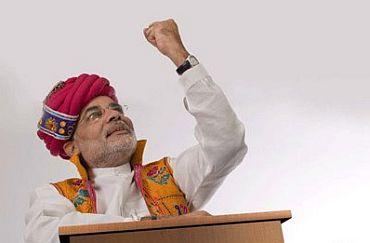 For Gujarat Chief Minister Narendra Modi, keeping away from food is no big deal. Since many years he has been fasting during the Navratri.
For Gujarat Chief Minister Narendra Modi, keeping away from food is no big deal. Since many years he has been fasting during the Navratri.
A thorough believer, Modi is very well-versed with different types of fasts in his personal life.
Of course, there is not an iota of doubt that the three days of fasting that he will undergo -- starting from his 61st birthday which falls on 17 September -- are political in nature where he is desperately searching for new political language to address, simultaneously, all 'Gujaratis,' including Hindus and Muslims.
But, fasting is a part of Gujarati culture and Modi's life, too. It will be difficult to find a Gujarati woman who has never observed fast in her life.
Modi was born at Vadnagar in Mehsana district of Gujarat. It's a charming mystical town of temples. The temples of Vadnagar are ancient, rich in culture and are known for its divinity.
Fasting is quite common in Gujarat, particularly in the temple towns. Modi comes from a family of grocers. Maganlal Ranchoddas, Modi's great grandfather, had started a grocery store in Vadnagar after migrating from Navdotra village in Banskantha district.
On 17 September, 1950, Modi was born in the house of "brick and mud" which had a corner full of frames of God. Since childhood he has been religious, and has been practicing jaap and doing prayers. His favourite temple in Vadnagar is the Giripur Mahadev.
According to a book written by M V Kamath and Dr Kalindi Randeri on Modi's life, he initially wanted to become a 'sanyasi.'
In fact, a holy man had seen his horoscope many years back, where he had professed that, "If this boy gets into politics, he would be as powerful as an emperor, or else he may become a sanyasi and eventually turn out to be like Shankaracharya."
Modi had so much attraction for sadhus, ways of fasting, tapsaya, jaap and meditation that he had ran away from home as soon as he finished school.
After wandering from Ramkrishna ashram of Belur in West Bengal to many other places, he took fascination of the Himalayas. Here he wandered aimlessly and stayed with unknown but yogic sadhus for weeks and months.
All those months Modi was trying to 'know himself'. Modi told the authors of his biography that he wanted to do something, but did not know exactly what.
In those teenage years Modi was immensely attracted towards the life and teachings of Swami Vivekananda.
After two years of wandering in Himalayas without money and with just two pairs of clothes, he suddenly decided to return back to 'sansar'.
On his return he met his mother briefly in his village and came to Ahmedabad and ran a canteen at the state transport office and soon joined the Rashtriya Swayamsevak Sangha.
Rest, as they say, is history.
While growing up in the RSS establishment in Gujarat under the influence of Marathi-speaking pracharkas, he also came under the spell of Chattrapati Shivaji.
In his early life Modi was a deep believer of mantra-tantra.
The Baglamukhi Devi's mantra is considered powerful by the hypnotic goddess's followers. In Ahmedabad few years back, some Brahmins had done Baglamukhi Devi's mantra-jaap for Modi's well-being when he was facing crisis.
After the burning of the Sabarmati train in Godhra in 2002, which sparked off widespread riots in Gujarat, Modi has not spoken much on how the events unfolded and how decisions were taken in his office, in his party and in his government.
He has not given glimpses of his thinking on the post-Godhra time that Gujarat has passed through and how he shaped political events thereafter.
One is sure that he must be having his own defence which he has not spelt out well.
Modi's idea of sadbhavana and harmony between communities of Gujarat will remain incomplete without knowing his mind on the events that made him terribly infamous, and stunningly famous, simultaneously.








